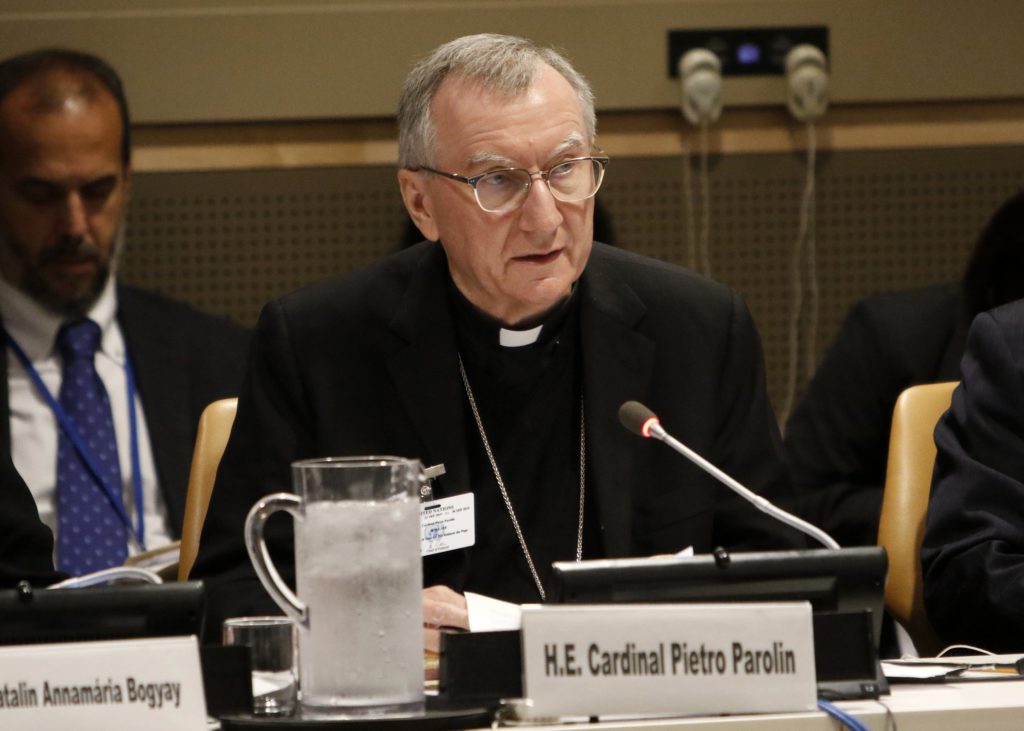This is Part 1 of CNA’s interview with Cardinal Parolin. You can read Part 2 here.
Cardinal Pietro Parolin, the Vatican’s secretary of state, has reiterated that Ukraine has a “legitimate” right to defend itself from Russian aggression, but he also has warned that weapons being sent there by other countries could lead to a “terrible” escalation of the war.
“Ukraine is resisting Russia based on this principle,” Parolin said in a recent exclusive interview with CNA, referring to the right of self defense.
“The international community wants to avoid an escalation, and so far, no one has personally intervened, but I see that many are sending weapons. This is terrible to think. It could cause an escalation that cannot be controlled,” he said. “However, the principle of legitimate defense remains.”
Parolin’s comments underscore the Holy See’s efforts to show solidarity with Ukraine and the innocent civilians caught up in the war, while simultaneously condemning the outbreak of violence there and working diplomatically to bring a halt to the fighting.
In the same interview, the cardinal also confirmed that discussions are underway about a possible summit between Pope Francis and the Patriarch Kirill of Moscow and All Russia. During the press conference on his return flight from Malta Sunday, the pope said such a meeting likely would take place at a neutral location in the Middle East.
“In the light of these latest events, I cannot say what will happen,” Parolin said.
Pope Francis met with the leader of the Russian Orthodox Church at Havana airport in Cuba on Feb. 12, 2016, in the first meeting between a pope and a Patriarch of Moscow. More recently, the two discussed the conflict in Ukraine during a video conference call on March 16. Parolin told CNA that Kirill had been the one who initiated the call.
In the hourlong interview with CNA, Parolin detailed the Holy See’s diplomatic efforts regarding Ukraine, which he said have been ongoing since Russia’s initial invasion of Ukraine in 2014 and subsequent annexation of Crimea.
Notably, however, the Holy See did not articulate similar statements on the right to self defense in the case of Crimea and, before that, in South Ossetia, in Georgia, where Russia used military force in 2008.
Asked why, Parolin responded: “Before, there was an ongoing dialogue, although this dialogue has not been concluded and has not achieved any positive outcome.”
“The parties, however, spoke, even with the participation of the international community. Borders were discussed,” Parolin said. “In a dialogue situation, it was logical that there should be no hostile act. Still, an attempt should be made to use all the means of the negotiation, hoping that the talks would be successful — which, unfortunately, did not happen.”
"On the issue of Ukraine, the Holy See has never ceased to focus attention on the situation of Donbas and the regions of Donetsk and Luhansk,” Parolin said.
“The Holy See has always insisted on respecting and applying the Minsk agreements, which seemed to be the main way to avoid what happened. And we have always insisted that there be the necessary flexibility on the part of Russia and Ukraine to apply the Minsk agreements correctly and effectively. In the conversation I had with [Russian] President Vladimir Putin on my trip in 2017, this theme also emerged,” Parolin said.
Parolin's trip to Moscow in 2017 was the first by a Vatican secretary of state since Cardinal Agostino Casaroli in 1988. Archbishop Paul Gallagher visited Moscow on behalf of the Holy See in November 2021.

